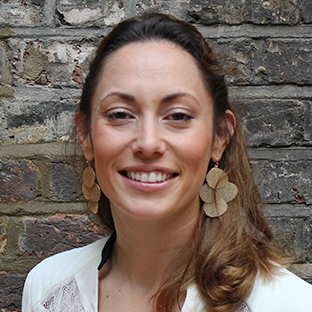Today makes me feel both frustrated and determined (I can hear my grandmother’s musings about the contradiction of humans…).
We all know the statistics: more women attend university than men but very few (5%) make it to the top of companies and women probably won't see financial equality until 2069. A good visual representation brings these numbers to life – but it’s an uncomfortable watch.
Although Facebook COO Sheryl Sandberg’s Lean In misses the point that society’s structural inequalities keep women and minorities firmly playing second fiddle (she also clears capitalism of any responsibility for changing the position of women in today’s culture – read Dawn Foster for an different perspective), she is right to highlight that women, among others, tend not to speak up.
As I go through my career I see this phenomenon more and more, even in the supposedly forward-thinking, liberal world of organisations that exist for social change. Our renowned Public Events curators at the RSA often share how hard it is to find women willing to speak on a public platform, certainly compared to men. In my previous workplace – an organisation that prized itself on being highly progressive– I had to call out that I was being paid less than my male colleagues for the same role. My boss, who was a proud feminist, said he just hadn’t realised. And even right here at the RSA one of our largest teams is majority white men of a similar age from similar backgrounds. The starkness is forcing us to look at bias in how we hire.
Unconscious bias is everyone’s issue, not just women’s, because it allows inequality to persist. While it’s pervasive (how often do you unconsciously gravitate towards the person that looks or sounds like you at a party, wedding, event?) I would argue that it is a symptom of a deeper cause of inequality. If we are to really tackle inequality then we need to acknowledge – and seek to change - how we treat women, girls and those that are different in our society. That means asking ourselves some difficult questions.
We think a lot about how change happens at RSA and we’re increasingly understanding that a change in our collective norms and values is a crucial to achieving progress in policy, practice or otherwise. My colleague Ian Burbidge recently made the case that diverse opinions lead to better outcomes and the RSA just launched the findings of a year-long commission into how an economy that works for all can be reached.
The world’s challenges, and the current attack on values many hold dear by the US President’s policies and behaviour, require inclusive and diverse voices to be heard. Whereas the 20th century was characterised by progress being driven by institutions, progress this century seems to be driven by grassroots movements facilitated by tech - think Occupy Movement, Women's March, Arab Spring, Black Lives Matter. These movements are challenging our norms and values, providing a different, arguably better, vision of the world.
It’s easy to not stop and question the status quo. As a new mother with a full-time job I have to prioritise what I care about and where I put my energy (I drafted this blog on the tube). But just being aware of our unconscious bias is not good enough – we must counteract it.
So here is my challenge for you, dear reader: seek out the person who seems most different to you and invite them to join the conversation. If you’re a Fellow of the RSA, invite people to join the Society who are different and diverse. If you’re in a meeting, invite questions from those that rarely speak. If you’re at an event, speak to the person with whom you perceive to have nothing in common.
And if you suffer from your own unconscious bias about yourself, every time you hesitate use that as a prompt to do what you’re fearful of. I am. It’s not leaning in or leaning back, it’s leaning forward with open arms to bring others with you so that together we can shape the world we want.
Happy International Women’s Day to all.
Related articles
-
The 30th anniversary of the Velvet Revolution
Alastair Merrill
Alastair Merrill FRSA reflects on the Velvet Revolution, which was key to freeing Czechoslovakia from Communist totalitarianism.
-
Local leaders around the world are rebuilding progressive politics
Riley Thorold
Cities and mayors are leading the way for democratic innovation and inclusive growth.
-
Can radical politics work?
Anthony Painter
What do Jeremy Corbyn, Donald Trump, and Vladimir Putin have in common? Not as much as we've been led to believe, argues Anthony Painter




Join the discussion
Comments
Please login to post a comment or reply
Don't have an account? Click here to register.
Thank you Natalie Nicholles for your challenge to seek out others different from you. Recent research shows bias awareness is not enough. What makes a difference? Implementation with empathy. My "Breaking Free from Bias" implementation book will be available for pre-order 11 April.
Thank you for your comments all. I don't know if anyone fully gets rid of their bias - I hope that by being more aware of it we can create a more equal world (honestly not as corny as it sounds). If we were all born equal then arguably there would be less need to be conscious of our biases.
George, I believe wholeheartedly in 'being the change we want to see'. Even if it is sometimes uncomfortable.
Catherine, I'd love to find out more about your book. I did a TEDx talk in 2015 in Holland for the RSA - finding out where your nearest TEDx is happening would be a good start. They tend to be themed.
Absolutely fantastic points, I consider that most if not all will somehow experience this type of unconscious bias which may be a form sub-consciousness bias. How do we rid ourselves of these subconscious biases? that often gives us the false assurances to justify. One of my objectives for joining the RSA was "to be the change I want to see" but I also know this is easier said than done. Many thanks for your wise insights. I look forward to hearing of further works in this area.
Couldn't agree more. Increasingly when I speak up its seen as 'emotional' when in fact its passionate and perhaps I am seeing more clearly the issue that I am raising. When I wrote my book in 2014 titled the Enlightened Organization I was encouraged to dumb down a bit rather then use it as an opportunity to encourage learning. I know that when I reach out to try to do a TED Talk, which is one of my ambitions, it will be more difficult to find people to hear the value my voice. But like you I lean forward serving purpose, maybe knowing that I am underpaid and undervalued by some. But inspired by your piece I will reach out now to see how one goes about doing a Ted Talk. Thanks Catherine
Good point, nicely made.